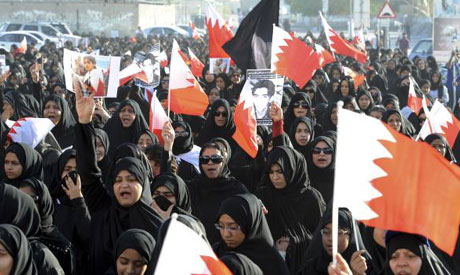
Anti-government protesters carrying Bahraini flags march at the funeral of 16-year-old protester Ali al-Badah in Sitra, south of Manama, November 19, 2011. Crowds of mourners confronted police in Bahrain on Saturday after a teenage protester was killed by a police car, residents said, heightening tensions in the Gulf state where majority Shi'ites are demanding more political rights. (Photo: Reuters)
Bahrain is bracing for the findings of a probe into a government crackdown on protesters as tension escalates in Shia areas and the opposition vows not to back down from demands for democratic reform.
The report due out on Wednesday, commissioned by King Hamad, will unveil the findings of Bahrain's Independent Commission of Inquiry into alleged government misconduct during the February-March crackdown on Shia-led protests.
Authorities say 24 people, including four policemen, were killed in a month of unrest, while the Shia-led opposition puts the death toll at 30. Hundreds more were injured.
Anti-government protests in mainly Shia areas on the outskirts of Manama have intensified this month, resulting in clashes with security forces that have left dozens injured and one 16-year-old boy dead.
The mass demonstrations which rocked the Sunni-ruled kingdom earlier this year were violently crushed as government forces used live ammunition and heavy-handed tactics in clashes with protesters.
The final blow to the protests, inspired by the Arab Spring, came in mid-March as Bahraini security forces, boosted by troops from Gulf nations, drove demonstrators out of Manama's Pearl Square – the focal point of protests.
Speaking at cabinet meeting on Sunday, King Hamad warned Bahrainis to steer clear of "anything that adversely affects" their unity.
Sporadic protests since March have intensified in anticipation of the commission's findings.
"The real question is what happens after the report," said human rights activist Mohammed Maskati.
"The situation is already very tense. The number of protests in the last two weeks is steadily increasing, as is the number of arrests," said Maskati who heads the Bahrain Youth Society for Human Rights.
He warned that the report should "at the very least reflect the conclusions of other international human rights organisations ... Otherwise, the crisis will escalate."
International organisations, including Amnesty International, Human Rights Watch and the UN human rights agency, have repeatedly accused the government of violating citizens' rights, citing allegations of torture, unfair trials, excessive use of force and violent repression.
Since the protests broke out, hundreds of Shias have been arrested, including prominent members of the opposition, medics, teachers and youth activists.
Bahrain's opposition groups have withheld comment until after the report is released, but at a joint press conference late Sunday they reaffirmed their commitment to democratic change.
"The Bahraini people will not go home-empty handed and we will not accept the status quo," said prominent Shiite cleric Sheikh Ali Salman, who heads Bahrain's largest opposition group, Al-Wefaq.
"After the report is released, we will meet to plan our next steps," said Salman.
"Our demands are clear: an elected government, a parliament with full authorities, an independent judiciary, security for all and a just electoral system," he said.
Salam warned that there was "no way out" of the current political crisis unless the demands were met.
"The opposition will continue with its demonstrations and protests and the peaceful actions inside and outside Bahrain, and we will not back down," he vowed.
In the 1990s, the archipelago state was also hit by a wave of Shiite-led unrest which abated after the government launched steps to convert the Gulf emirate into a constitutional monarchy.
The commission, which has interviewed thousands of opposition officials and government representatives, is composed of five lawyers, including foreign nationals, and headed by international law and human rights expert Cherif Bassiouni.
In August, the commission was forced to close down its office in Manama after it was stormed by a mob angered by media claims that the panel had cleared authorities of crimes.
The incident demonstrated the sensitivity of the report and the potential for further escalation if the findings released on Wednesday do not live up to the expectations of the opposition.
"If the report's conclusions are weak, there is real potential for escalation," predicted Maskati.
Short link: